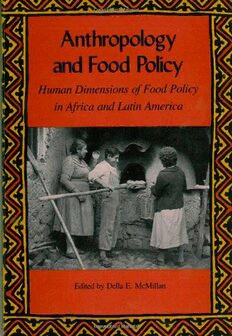
Anthropology and Food Policy: Human Dimensions of Food Policy in Africa and Latin America PDF
Preview Anthropology and Food Policy: Human Dimensions of Food Policy in Africa and Latin America
Anthropology and Food Policy This page intentionally left blank Anthropology and Food Policy Human Dimensions of Food Policy in Africa and Latin America Delia E. McMillan, Editor With the assistance of Jeanne Harlow Southern Anthropological Society Proceedings, No. 24 Mary W. Helms, Series Editor The University of Georgia Press Athens and London Southern Anthropological Society Founded 1966 OFFICERS, 1989-90 Andrew W. Miracle, President Holly F. Mathews, President-Elect Thomas A. Arcury, Secretary-Treasurer Benita J. Howell, Councilor Thomas W. Collins, Councilor Patricia B. Lerch, Councilor Mary W. Helms, Series Editor Gilford S. Nickerson, Newsletter Editor Program Coordinator, 1989 Thomas W. Collins © 1991 by the Southern Anthropological Society Published by the University of Georgia Press Athens, Georgia 30602 All rights reserved Set in Times Roman The paper in this book meets the guidelines for permanence and durability of the Committee on Production Guidelines for Book Longevity of the Council on Library Resources. Printed in the United States of America 95 94 93 92 91 5 4 3 21 Library of Congress Cataloging in Publication Data Anthropology and food policy : human dimensions of food policy in Africa and Latin America / Delia E. McMillan, editor, with the assistance of Jeanne Harlow. p. cm.—(Southern Anthropological Society proceedings ; no. 24) Includes bibliographical references (p. ). ISBN 0-8203-1287-8 (alk. paper).—ISBN 0-8203-1288-6 (pbk. : alk. paper) 1. Nutrition policy—Africa. 2. Nutrition policy—Latin America. 3. Applied anthropology—Africa. 4. Applied anthropology—Latin America. I. McMillan, Delia E. II. Harlow, leanne. III. Series. GN2.S9243 no. 24 [TX360.A26] 301 s—dc20 [363.8'096] 90-11000 CIP British Library Cataloging in Publication Data available To Ronald Cohen gentle mentor of many anthropologists in food policy This page intentionally left blank Contents Introduction 1 Delia E. McMillan Mexico's Two Green Revolutions: Feed for Food 12 Billie R. DeWalt and David Barkin Learning from Experience: Implementing Farming Systems Research and Extension in the Malawi Agricultural Research Project 40 Art Hansen Livestock Development, Policy Issues, and Anthropology in East Africa 66 /. Terrance McCabe Anthropology and the Analysis of African Food Markets: Assessing Market Efficiency at the Village Level 86 Edward B. Reeves Inter- and Intrahousehold Income Allocation: Implications for Third World Food Policy 112 Roberta D. Baer Integrating Nutritional Concerns into Adaptive Small Farm Research Programs 126 Kathleen M. DeWalt The Food Game in Latin America 145 PaulL. Doughty References 167 Contributors 189 This page intentionally left blank Introduction Delia E. McMillan Why study food policy? From the 1960s to the 1970s the world exalted in the original promise and performance of the Green Revolu- tion, which produced spectacular increases in many staple food crops in Asia and Latin America. Many observers were optimistic that the gross shortcomings in world food production would soon be ended. Unfortunately, as the decade of the 1980s developed, these increases slowed and in the face of continued population growth, distortions in world food supplies resumed their former prominence. For many policymakers, the problem lay in developing still more sophisticated production techniques. For others the complexity of the world's social, political, and economic systems suggested that there were many more variables that had to be considered before the problem of hunger and malnutrition could be solved. Food policy developed either by nations or international organiza- tions, in the view of a new generation of researchers, has to include not only the multiple aspects of production but also the multiple effects of distribution patterns stemming from individual national policies, international food trade competition, the availability and use of food aid, social class, cultural biases and conflicts, and the operations of different types of markets. In addition, a wide variation in consump- tion patterns and preferences was related to conditions of health and well-being, age and gender, social and cultural conflict, and classic rural-urban divisions within populations. With such an extraordinarily complex range of variables, something more is needed before an effective worldwide system of policies can be developed to manage both individual national and international food problems. It is a task that cannot be solved by one discipline alone but requires the collaborative effort of motivated researchers working from grassroots levels to computerized think tanks, from field anthropolo-
